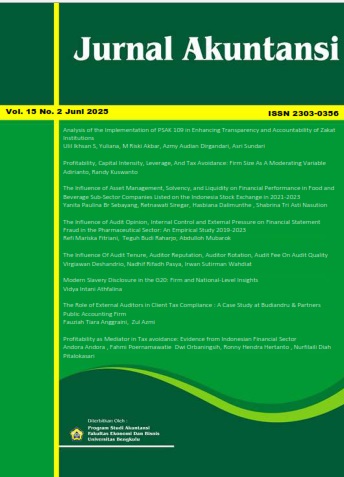Main Article Content
Abstract
The urgency for firms to disclose modern slavery practices has increased in light of global human rights concerns. This study investigates the firm-level and country-level determinants that influence modern slavery disclosure using panel data from 6,757 firm-year observations across listed firms in G20 countries (2015–2020). Data from the listed firm in the G20 countries were used. These nations have contributed most of the world's GDP and share the objective of adhering to modern slavery standards. Employing a panel data regression model with fixed effects and robust standard errors, grounded in neo-institutional and stakeholder theories, the analysis incorporates variables such as corporate governance, firm size, profitability, state governance, and legal system. Secondary data were collected from the Thomson Reuters Eikon and World Bank databases. The results indicate that firm governance (β = 0.0623; p < 0.01), firm size (β = 1.31; p < 0.01), country-level governance (β = 3.69; p < 0.01), and civil law legal system (β = 12.74; p < 0.01) have a statistically significant positive impact on modern slavery disclosure. Profitability is found to have no significant influence (p > 0.10). The final model explains 21.6% of the variance in disclosure (R² = 0.216). These findings demonstrate that both firm-internal characteristics and national institutional contexts play a decisive role in shaping disclosure practices, with firms in civil law countries and those with stronger governance frameworks reporting substantially higher levels of information. This study contributes to the literature in several ways. First, it provides large-scale empirical evidence across multiple countries, addressing the lack of cross-country analyses in prior research. Second, it integrates firm-level and country-level determinants within a unified model, offering new insights into how internal resources and external pressures jointly influence modern slavery transparency. Finally, by highlighting the non-significance of profitability, this research challenges assumptions that stronger financial performance automatically leads to more ethical disclosure, thereby expanding the theoretical understanding of disclosure behavior. Firms have varying levels of disclosure of modern slavery. Businesses and investors have an obligation to uphold human rights in their supply chains and combat modern forms of slavery, including forced labor and human trafficking. Overall, the results underscore the importance of robust corporate governance, institutional quality, and legal frameworks in promoting accountability and transparency in addressing modern slavery risks..
Article Details
Copyright (c) 2025 Vidya Intani Athfalina

This work is licensed under a Creative Commons Attribution-ShareAlike 4.0 International License.
Author retains the copyright and grants the journal the right of first publication of the work simultaneously licensed under the Creative Commons Attribution-ShareAlike 4.0 License that allows others to share the work with an acknowledgement of the work's authorship and initial publication in this journal
Author is able to enter into separate, additional contractual arrangements for the non-exclusive distribution of the journal's published version of the work (e.g., post it to an institutional repository or publish it in a book) with the acknowledgement of its initial publication in this journal.
Author is permitted and encouraged to post his/her work online (e.g., in institutional repositories or on their website) prior to and during the submission process, as it can lead to productive exchanges, as well as earlier and greater citation of the published work (See The Effect of Open Access).
Creative Commons Attribution-ShareAlike (CC BY-SA)
Jurnal Akuntansi is licensed under a Creative Commons Attribution-ShareAlike 4.0 International License.

